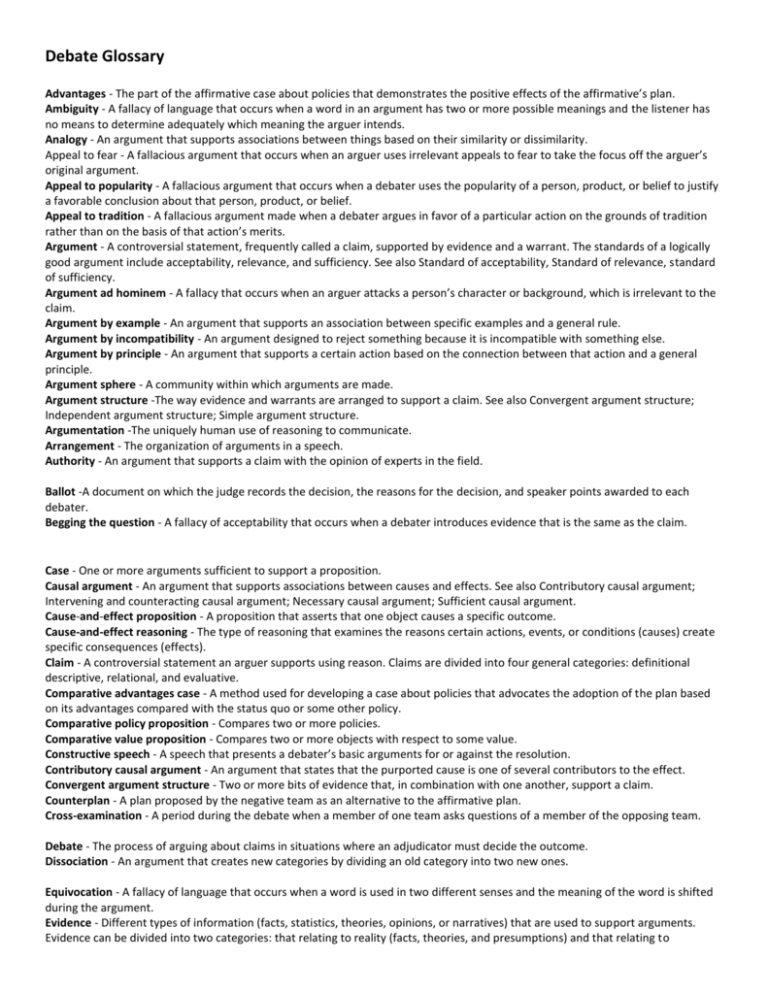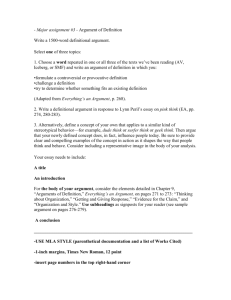Debate Glossary - Jeannesclasses
advertisement

Debate Glossary Advantages - The part of the affirmative case about policies that demonstrates the positive effects of the affirmative’s plan. Ambiguity - A fallacy of language that occurs when a word in an argument has two or more possible meanings and the listener has no means to determine adequately which meaning the arguer intends. Analogy - An argument that supports associations between things based on their similarity or dissimilarity. Appeal to fear - A fallacious argument that occurs when an arguer uses irrelevant appeals to fear to take the focus off the arguer’s original argument. Appeal to popularity - A fallacious argument that occurs when a debater uses the popularity of a person, product, or belief to justify a favorable conclusion about that person, product, or belief. Appeal to tradition - A fallacious argument made when a debater argues in favor of a particular action on the grounds of tradition rather than on the basis of that action’s merits. Argument - A controversial statement, frequently called a claim, supported by evidence and a warrant. The standards of a logically good argument include acceptability, relevance, and sufficiency. See also Standard of acceptability, Standard of relevance, standard of sufficiency. Argument ad hominem - A fallacy that occurs when an arguer attacks a person’s character or background, which is irrelevant to the claim. Argument by example - An argument that supports an association between specific examples and a general rule. Argument by incompatibility - An argument designed to reject something because it is incompatible with something else. Argument by principle - An argument that supports a certain action based on the connection between that action and a general principle. Argument sphere - A community within which arguments are made. Argument structure -The way evidence and warrants are arranged to support a claim. See also Convergent argument structure; Independent argument structure; Simple argument structure. Argumentation -The uniquely human use of reasoning to communicate. Arrangement - The organization of arguments in a speech. Authority - An argument that supports a claim with the opinion of experts in the field. Ballot -A document on which the judge records the decision, the reasons for the decision, and speaker points awarded to each debater. Begging the question - A fallacy of acceptability that occurs when a debater introduces evidence that is the same as the claim. Case - One or more arguments sufficient to support a proposition. Causal argument - An argument that supports associations between causes and effects. See also Contributory causal argument; Intervening and counteracting causal argument; Necessary causal argument; Sufficient causal argument. Cause-and-effect proposition - A proposition that asserts that one object causes a specific outcome. Cause-and-effect reasoning - The type of reasoning that examines the reasons certain actions, events, or conditions (causes) create specific consequences (effects). Claim - A controversial statement an arguer supports using reason. Claims are divided into four general categories: definitional descriptive, relational, and evaluative. Comparative advantages case - A method used for developing a case about policies that advocates the adoption of the plan based on its advantages compared with the status quo or some other policy. Comparative policy proposition - Compares two or more policies. Comparative value proposition - Compares two or more objects with respect to some value. Constructive speech - A speech that presents a debater’s basic arguments for or against the resolution. Contributory causal argument - An argument that states that the purported cause is one of several contributors to the effect. Convergent argument structure - Two or more bits of evidence that, in combination with one another, support a claim. Counterplan - A plan proposed by the negative team as an alternative to the affirmative plan. Cross-examination - A period during the debate when a member of one team asks questions of a member of the opposing team. Debate - The process of arguing about claims in situations where an adjudicator must decide the outcome. Dissociation - An argument that creates new categories by dividing an old category into two new ones. Equivocation - A fallacy of language that occurs when a word is used in two different senses and the meaning of the word is shifted during the argument. Evidence - Different types of information (facts, statistics, theories, opinions, or narratives) that are used to support arguments. Evidence can be divided into two categories: that relating to reality (facts, theories, and presumptions) and that relating to preference (values, value hierarchies, and value categories). See also Facts; Presumption; Theory; Value; Value categories; Value hierarchy. Facts - Observed or observable data. Fallacy - An argument that fails to meet any one of the standards of acceptability, relevance, and sufficiency. See also Argument ad hominem; Ambiguity; Appeal to fear; Appeal to popularity; Appeal to tradition; Begging the question; Equivocation; Fallacy of composition; Fallacy of division; Fallacy of incompatibility; Faulty analogy; Hasty conclusion; Improper appeal to practice; Loaded term; Poisoning the well; Post hoc fallacy; Problematic premise; Red herring; Slippery slope argument; Straw person fallacy; Two wrongs fallacy; Vagueness. Fallacy of composition - A fallacious argument where the evidence is drawn from some part of a whole but the conclusion is about the whole. Fallacy of division - An erroneous argument where the evidence is drawn from the whole, but the conclusion is made about the part. Fallacy of incompatibility - Occurs when a debater makes a statement as evidence that is at odds with another statement made by the debater, or when a debater’s argument is incompatible with some action she has performed or recommended elsewhere. Faulty analogy - A fallacious argument that occurs when two cases are compared with each other but are not similar in terms of the relationship stated in the comparison. Guilt by association - A fallacious argument that occurs when a person’s argument is attacked using that person’s association with groups and people rather than using issues pertinent to the argument. Hasty conclusion - A fallacious argument that fails to meet the standard of sufficiency. It includes hasty generalization, irrelevant slippery slope arguments, fallacy of composition, fallacy of division, faulty analogy, improper appeal to practice, post hoc fallacy, and two wrongs. Hasty generalization - A fallacy of reasoning by example that occurs when the examples selected to support the claim are either insufficient in number or in their representativeness. Improper appeal to practice A fallacious argument that occurs when a debater suggests doing something because it is a common practice, even if that practice clearly is wrong. Independent argument structure - Several pieces of evidence, any one of which can provide sufficient support for a claim. International debating - Debating that occurs between representatives of different countries, nations, or cultures. Intervening and counteracting causal argument - An argument that demonstrates a cause that prevents the completion of a causeand-effect sequence. Irrelevant reason - An argument that fails to meet the relevance criterion. It includes ad hominem argument, appeal to fear, appeal to popularity, appeal to tradition, guilt by association, poisoning the well, red herring, and straw person. Judge - An observer of a debate who has the responsibility of deciding which team has done a better job of debating. Loaded term - A fallacy of language that occurs when the arguer labels something with a word that includes an evaluation and that evaluation plays a role in supporting the conclusion. Method of agreement - A method of reasoning used in cause-and-effect analysis that examines more than one case where two elements are simultaneously present, concluding that one is the cause of the other. Method of correlation - A method of reasoning used in cause-and-effect analysis that examines examples that demonstrate that as the amount of the cause increases (or decreases), the effect will also increase (or decrease). Method of difference - A method of reasoning used in cause-and-effect analysis that examines examples wherein both the purported cause and the purported effect are absent, concluding that one is the cause of the other. Minor repair - A strategy the negative uses to defend the present system with minor changes. Necessary causal argument - An argument that states that without the suspected cause, the effect cannot occur, thus the cause is necessary to produce the effect. Need - The part of the affirmative case about policies that identifies a certain problem in the status quo that the existing system cannot solve. Need-plan-benefit case - A method used for developing a case about policies that involves the identification of a need, proposal of a plan, and a demonstration of the advantages of the plan. Plan - A course of action proposed by the affirmative when debating a proposition of policy that proposes to solve the problems identified in the “need.” Poisoning the well - A fallacious argument that attempts to discredit a person or a source in advance of that person’s argument. Post hoc fallacy - Occurs when a debater assumes that because one thing predates another, the first must have caused the second. Preparation time - The time allotted to each team for preparation during the debate (eight minutes in Karl Popper debate). Presumption - The assumption that current policies will be maintained until someone makes a case that another policy is a better option. Presumption (evidence) - A statement concerning what people ordinarily expect to happen in the course of normal events. Problematic premise - A fallacious argument that fails to meet the acceptability criterion. It includes begging the question and the fallacy of incompatibility. Proposition - A final claim made by a debater and supported by a combination of claims. Proposition of definition - Asserts that a certain definition should be applied to a certain category of things. Proposition of description - Asserts a proper way to describe an object or a number of objects. Proposition of evaluation - Attaches a value to any object. Proposition of relationship - Assert a certain relationship between objects. Proposition of similarity - Asserts that two objects are similar to each other. Reasoning - The process used to connect evidence to the claim. See also warrant. Rebuttal speeches - The speeches in the debate that challenge and defend arguments introduced in the constructive speeches. Red herring - A fallacious argument that shifts the focus from the original argument. Refutation - The process of attacking and defending arguments. Research - The process of locating and selecting evidence in preparation for debate. Reservation - An exception made to a claim. A reservation usually involves a situation in which the arguer does not wish to maintain the claim. Simple argument structure - A single claim leading from a single piece of evidence following along a single warrant. Simple policy proposition - A proposition that urges adoption of a certain policy. Simple value proposition - Attaches a value to a single object. Slippery slope argument- An argument that connects a series of events in a causal chain that ultimately leads to disaster or calamity. Slippery slope arguments are fallacies if the series of events is improperly connected. Standard of acceptability - Determines whether the evidence is acceptable to those who judge the argument. Standard of relevance - Determines whether the evidence is relevant to the claim it supports. Standard of sufficiency - Determines whether all of the evidence taken as a whole is sufficient to support the claim. Standards of a logically good argument - Standards are acceptability, relevance, and sufficiency. Stasis - A system devised to determine the key issues of clash in a topic. These key issues can be used to develop a system of research. Status quo - The course of action currently pursued (i.e., the present system). Straw person fallacy - Occurs when an arguer, intentionally or unintentionally, misinterprets an opponent’s argument, then proceeds to refute the misinterpreted argument as if it were the opponent’s actual argument. Style - The use of language, voice, and body language used by a debater. Sufficient causal argument - An argument that states that the presence of a cause virtually guarantees (is sufficient for) the presence of the effect. Theory - A statement that explains other facts or that predicts the occurrence of events. Toulmin Model of argument - A model of argument developed by philosopher Stephen Toulmin. The basic model includes evidence, warrant, claim, and reservation. Two wrongs fallacy - Occurs when a debater makes an argument urging the audience to accept, or condone, one thing that is wrong because another similar thing, also wrong, has been accepted and condoned. Vagueness - A fallacy of language that occurs when the meaning of some word or words in an argument is indeterminate and when such vagueness prevents listeners from assessing the argument. Value - Evidence based on the audience’s preferred value. Value case - A case supporting a proposition of value. Three principal elements of such a case are describing, relating, and evaluating. Value categories (evidence) - An arrangement of values into groups so that a group (category) can be used as evidence. Value hierarchy (evidence) - Evidence based on how values are arranged in relation to each other. Warrant - Stated or unstated reasoning process that explains the relationship between the evidence and the claim.






